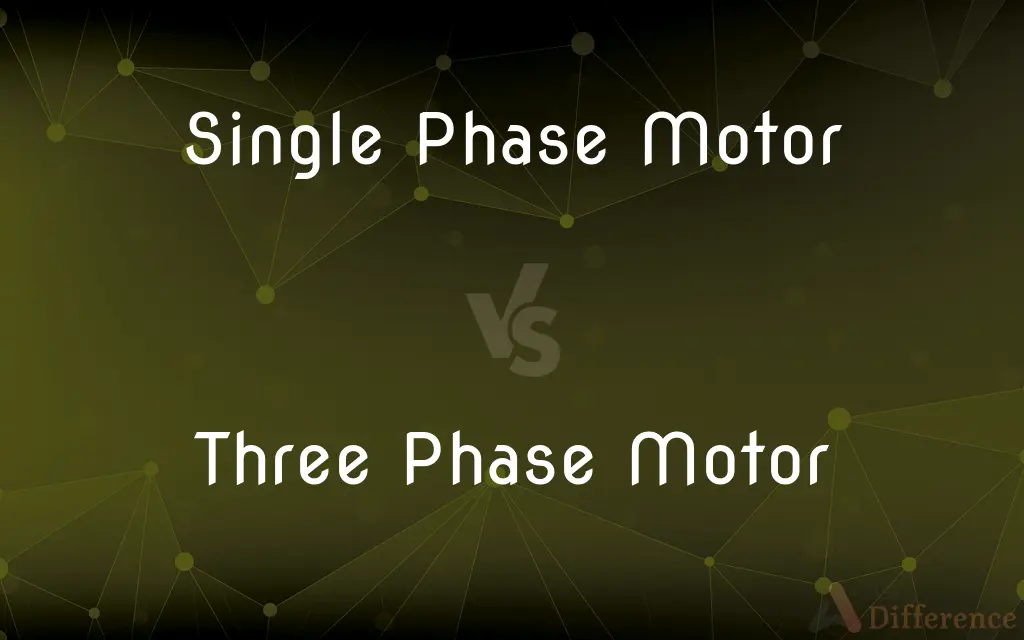Single Phase Motor vs. Three Phase Motor — What's the Difference?
By Tayyaba Rehman & Urooj Arif — Published on February 6, 2024
A single-phase motor runs on a single power phase, suitable for lower power needs, while a three-phase motor uses three power phases, ideal for high power applications.

Difference Between Single Phase Motor and Three Phase Motor
Table of Contents
ADVERTISEMENT
Key Differences
Single-phase motors operate on a single alternating current (AC) power phase, making them simpler and less expensive in construction. Conversely, three-phase motors use three alternating current phases, providing more consistent power delivery and efficiency. Both types of motors are used to convert electrical energy into mechanical energy, but their applications and efficiency differ.
In terms of power output, single-phase motors are generally used for smaller loads like home appliances due to their limited power capacity. Three-phase motors, however, are capable of handling larger, industrial-scale loads, making them a common choice in manufacturing and heavy machinery. Both single-phase and three-phase motors serve essential roles but are tailored for different power requirements.
The efficiency and performance of single-phase motors are lower compared to three-phase motors. This is due to the single-phase motor's tendency to have more vibrations and less stable torque. In contrast, three-phase motors offer smoother and more reliable operation with higher torque, ideal for continuous and demanding applications. Both motor types have unique characteristics that define their suitability for various tasks.
Installation and maintenance of single-phase motors are generally easier and more cost-effective, suited for residential or small-scale commercial use. On the other hand, three-phase motors require more complex setups and maintenance, reflecting their use in industrial settings. Both types, however, play crucial roles in their respective environments, powering a wide range of devices and machinery.
Single-phase motors are typically found in applications where simplicity and cost-effectiveness are priorities, like in household appliances. Three-phase motors, with their higher power efficiency and capability, are more suited for applications requiring continuous and high-power output, such as in industrial machinery. Both motor types are fundamental in their domains, driving the functionality of numerous devices and systems.
ADVERTISEMENT
Comparison Chart
Power Supply
Operates on a single AC power phase.
Utilizes three AC power phases for operation.
Application
Suitable for smaller loads, such as home appliances.
Ideal for larger, industrial-scale loads.
Efficiency and Performance
Generally lower efficiency and performance.
Higher efficiency and performance.
Installation and Maintenance
Simpler and more cost-effective.
More complex and typically more expensive.
Torque Stability
Less stable torque, more vibrations.
Smoother operation with stable and higher torque.
Compare with Definitions
Single Phase Motor
An electric motor used primarily for small-scale applications.
He installed a single-phase motor in his garage workshop for basic tools.
Three Phase Motor
A motor utilizing three alternating current power phases for high efficiency.
The three-phase motor in the factory drives heavy machinery with ease.
Single Phase Motor
A simpler, often more cost-effective motor for light-duty tasks.
The single-phase motor in the fan ensures quiet and efficient operation.
Three Phase Motor
Suited for heavy-duty industrial and commercial applications.
Their new production line is powered by a robust three-phase motor.
Single Phase Motor
A motor that operates on a single alternating current power phase.
The single-phase motor in the washing machine provides sufficient power for household laundry needs.
Three Phase Motor
Known for its reliable performance and stable torque in challenging environments.
The three-phase motor powers the CNC machine with precision and consistency.
Single Phase Motor
Ideal for residential or small commercial settings due to its power constraints.
The air conditioner uses a single-phase motor for energy-efficient home cooling.
Three Phase Motor
Preferred in settings requiring continuous and high-power output.
The water treatment plant uses a three-phase motor for uninterrupted operation.
Single Phase Motor
Characterized by its single power input and ease of use.
Her home sewing machine's single-phase motor offers simplicity and reliability.
Three Phase Motor
Offers higher power output and smoother operation for demanding tasks.
The three-phase motor in the elevator ensures a smooth and steady ascent.
Common Curiosities
What is a single-phase motor?
A single-phase motor operates on one alternating current (AC) power phase, typically used for light-duty applications.
Can a single-phase motor be used for heavy industrial applications?
Single-phase motors are generally not suitable for heavy industrial applications due to their limited power output.
What are the advantages of single-phase motors?
Single-phase motors are simple, cost-effective, and suitable for smaller loads and residential applications.
What are the disadvantages of single-phase motors?
They have limited power output compared to three-phase motors and are less efficient for larger applications.
Can single-phase motors be reversed in direction?
Yes, the direction of rotation in a single-phase motor can be reversed by swapping the connections of the start winding or using a reversing switch.
How do you start a single-phase motor?
Single-phase motors typically use either a starting capacitor or a centrifugal switch to initiate rotation.
What are the advantages of three-phase motors over single-phase motors?
Three-phase motors offer higher efficiency, greater power output, and smoother operation, making them suitable for heavy-duty applications.
Do three-phase motors require starting capacitors or switches?
In most cases, three-phase motors do not require starting capacitors or switches because they have self-starting properties.
What is the voltage typically supplied to single-phase motors in households?
Single-phase motors in households are usually supplied with 120 or 240 volts AC, depending on the region.
Can three-phase motors be operated on a single-phase power supply?
No, three-phase motors require a three-phase power supply and cannot operate on a single-phase supply without a phase converter.
What is a three-phase motor?
A three-phase motor is an electric motor that operates on a three-phase AC power supply, providing higher power output compared to single-phase motors.
Where are three-phase motors commonly used?
Three-phase motors are commonly used in industrial machinery, large pumps, compressors, and manufacturing processes.
How is the speed control of three-phase motors achieved?
Speed control in three-phase motors is often achieved using variable frequency drives (VFDs) or by changing the number of poles.
What is the most common voltage and frequency for three-phase motors?
The most common voltages for three-phase motors are 208V, 230V, and 460V, with frequencies of 50 or 60 Hz.
Where are single-phase motors commonly used?
Single-phase motors are commonly used in household appliances like fans, pumps, and small machinery.
Share Your Discovery

Previous Comparison
Soccer Cleats vs. Rugby Cleats
Next Comparison
B.B.A. vs. B.B.M.Author Spotlight
Written by
Tayyaba RehmanTayyaba Rehman is a distinguished writer, currently serving as a primary contributor to askdifference.com. As a researcher in semantics and etymology, Tayyaba's passion for the complexity of languages and their distinctions has found a perfect home on the platform. Tayyaba delves into the intricacies of language, distinguishing between commonly confused words and phrases, thereby providing clarity for readers worldwide.
Co-written by
Urooj ArifUrooj is a skilled content writer at Ask Difference, known for her exceptional ability to simplify complex topics into engaging and informative content. With a passion for research and a flair for clear, concise writing, she consistently delivers articles that resonate with our diverse audience.













































